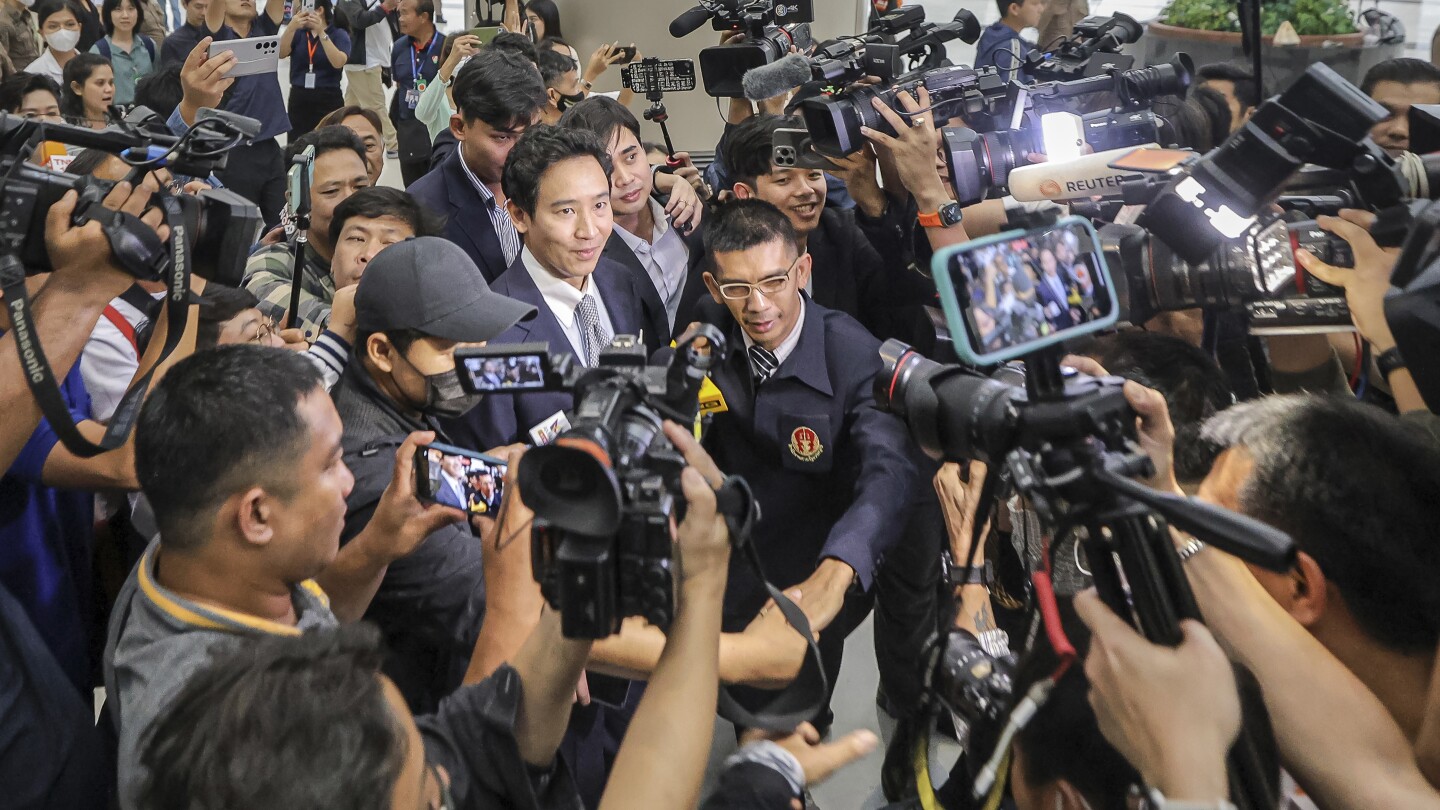BANGKOK (AP) — A court in Thailand on Wednesday ordered the dissolution of the progressive Move Forward Party, which finished first in last year’s general election, saying it violated the constitution by proposing an amendment of a law against defaming the country’s royal family.
The Constitutional Court said it voted unanimously to dissolve the party because its campaign to amend the law was considered an attempt to overthrow the nation’s constitutional monarchy.
The Move Forward Party was unable to form a government after topping the polls because members of the Senate, at that time a conservative military-appointed body, declined to endorse its candidate for prime minister.
The Election Commission had filed a petition against the Move Forward Party after the Constitutional Court ruled in January that it must stop advocating changes to the law, known as Article 112, which protects the monarchy from criticism with penalties of up to 15 years in jail per offense.
The ruling also imposed a 10-year ban on political activity on those who held the party’s executive positions while it campaigned for the proposed amendment. Among them are its charismatic former leader, Pita Limjaroenrat, and current chief Chaithawat Tulathon.
It remained unclear what will happen to the rest of its non-executive lawmakers, although Pita said in an interview with The Associated Press that the party will ensure they have a “smooth transition into a new house,” or a new party.
Lawmakers of a dissolved political party can keep their seats in Parliament if they move to a new party within 60 days.
Move Forward and its reform agenda shook up Thai politics by winning the most seats in the 2023 elections even though afteward it was blocked from taking power. The latest legal action is one of many that have drawn widespread criticism and are seen as part of a yearslong attack on the country’s progressive movement by conservative forces trying to keep their grip on power.
The party was denied power after the Senate refused to accept its then-leader Pita’s nomination as prime minister. Senators, who were given power to veto prime ministerial candidates by the constitution adopted in 2017 under a military government, said they opposed Pita because of his intention to reform the royal defamation law. Move Forward was later removed from a coalition formed with the now-governing Pheu Thai party and became head of the opposition.
In its arguments submitted to the court, Move Forward said the Constitutional Court does not have jurisdiction to rule on the case and the petition filed by the Election Commission did not follow due process because Move Forward was not given an opportunity to defend itself before it was submitted to the court. The court said in its ruling that it has the authority to rule on the case, and that its previous ruling in January was enough of an evidence for the Election Commission to file the case without having to hear more evidence from the party.
Human rights organizations have expressed concern about the case. Amy Smith, executive director of the human rights group Fortify Rights, ahead of the ruling called the attempt to disband Move Forward “a direct attack on democratic principles” that “severely undermines Thailand’s commitment to human rights.”
The chairperson of the U.S. Senate Foreign Relations Committee, Sen. Ben Cardin, sent a letter to Thai Foreign Minister Maris Sangiampongsa to express his concern. He said that dissolving a party that “secured a significant victory” in the 2023 elections would “disenfranchise millions of voters who called for progressive change and democratic reform.”
Prime Minister Srettha Thavisin has maintained that the Thai justice system is fair and impartial, and that the government cannot interfere with the judicial process.
Move Forward’s predecessor, the Future Forward party, was dissolved by the Constitutional Court in 2020 on charges of violating election laws on donations to political parties.
Thailand’s courts, especially the Constitutional Court, are considered a bulwark of the country’s royalist establishment, which has used them and nominally independent state agencies such as the Election Commission to issue rulings to cripple or sink political opponents.
The dissolution of Future Forward, whose promises of reforms were particularly attractive for younger people disillusioned after years of military rule, further highlighted the struggle between the progressive movement and conservative forces in Thailand. It was one of the triggers for youth-led pro-democracy protests that sprang up across the country in 2020. The protests openly criticized the monarchy, an institution previously considered untouchable and a linchpin of Thai society.
The protests led to vigorous prosecutions under Article 112, which previously had been relatively rarely employed. Critics say the law is often wielded as a tool to quash political dissent.
Move Forward, formed as a new home for lawmakers from the dissolved Future Forward party, campaigned for an amendment of the article and other democratic reforms in the 2023 elections. It won first place in the balloting, a surprise victory indicating that many Thai voters were ready for change.
Move Forward has insisted that it wants to keep the monarchy above politics and not be exploited as a political tool.

